Related Research Articles

Julia Clifford Lathrop was an American social reformer in the area of education, social policy, and children's welfare. As director of the United States Children's Bureau from 1912 to 1922, she was the first woman ever to head a United States federal bureau.
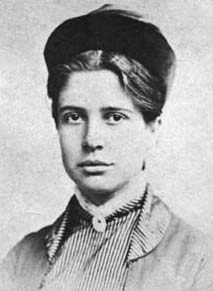
Florence Moltrop Kelley was a social and political reformer and the pioneer of the term wage abolitionism. Her work against sweatshops and for the minimum wage, eight-hour workdays, and children's rights is widely regarded today.
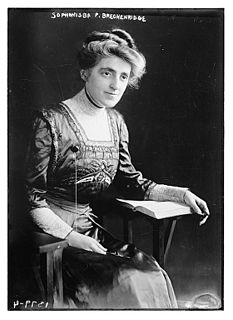
Sophonisba Preston Breckinridge was an American activist, Progressive Era social reformer, social scientist and innovator in higher education. She was the first woman to earn a Ph.D. in political science and economics then the J.D. at the University of Chicago, and she was the first woman to pass the Kentucky bar. In 1933, President Franklin D. Roosevelt sent her as a delegate to the 7th Pan-American Conference in Uruguay, making her the first woman to represent the U.S. government at an international conference. She led the process of creating the academic professional discipline and degree for social work.
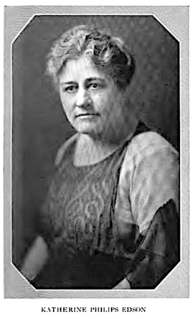
Katherine Philips Edson was an American reformer and social activist who had a key role in changing the labor conditions in California and across the nation.
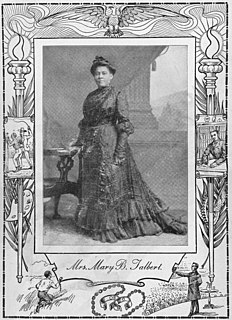
Mary Burnett Talbert was an American orator, activist, suffragist and reformer. Called "the best known Colored Woman in the United States," Talbert was among the most prominent African Americans of her time. In 2005, Talbert was inducted into the National Women's Hall of Fame.

Janie Porter Barrett was an American social reformer, educator and welfare worker. She established the Virginia Industrial School for Colored Girls, a pioneering rehabilitation center for African-American female delinquents. She was also the founder of the Virginia State Federation of Colored Women's Clubs.
Jennie Carolyn (Sullivan) Van Ness was a leader in the women's suffrage and Prohibition movements in New Jersey. She was one of the first two women to serve in the New Jersey Legislature, elected in 1920 as a Republican.

Daisy Elizabeth Adams Lampkin was an American suffragist, civil rights activist, organization executive, and community practitioner whose career spanned over half a century. Lampkin’s effective skills as an orator, fundraiser, organizer, and political activist guided the work being conducted by the National Association of Colored Women (NACW); National Association for the Advancement of Colored People (NAACP); National Council of Negro Women and other leading civil rights organizations of the Progressive Era.
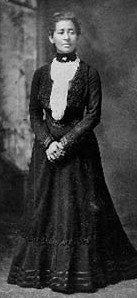
Selena Sloan Butler (1872–1964) is the founder and first president of the National Congress of Colored Parents and Teachers Association (NCCPT). President Herbert Hoover appointed her to the White House Conference on Child Health and Protection in 1929. During World War II, she organized the Red Cross' first black women's chapter of "Gray Ladies." When Congress merged the NCCPT with the National PTA in 1970, Butler was posthumously recognized as one of the organization's founders. Today, Butler is considered a co-founder of the National Parent-Teacher Association.

Lillian Ford Feickert was an American suffragette, New Jersey state political organizer, and the first woman from New Jersey to run for United States Senate. She served as the President of the New Jersey Woman Suffrage Association from 1912 to 1920, and later helped organize the New Jersey League of Women Voters. She went on to serve as the Vice-Chairman of the New Jersey Republican State Committee and unsuccessfully ran for the US Senate in 1928.
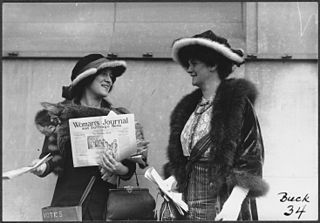
Margaret Lillian Foley was an Irish-American labor organizer, suffragist, and social worker from Boston. Known for confronting anti-suffrage candidates at political rallies, she was nicknamed the "Grand Heckler."

Victoria Clay Haley, later Victoria Clay Roland, was an American suffragist, clubwoman, bank executive, and fundraiser based in St. Louis, Missouri and later in Chicago.

Ora Brown Stokes Perry (1882-1957) was an American educator, probation officer, temperance worker, and clubwoman based in Richmond, Virginia.
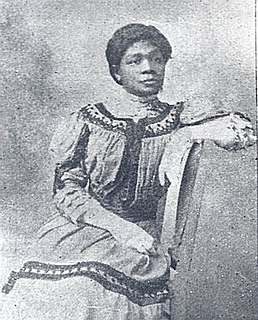
Harriet Redmond, also known as Hattie Redmond, was an African-American suffragist who lived and worked in Portland, Oregon. Born in St. Louis, Missouri, she moved to Oregon at a young age where she then became an active member of the suffragist movement.
Myra Virginia Simmons was a California suffragist and leader of the Colored American Equal Suffrage League (CAESL). She was a prominent Bay Area community organizer who served as Chair of the Women’s Civic and Progressive League in Oakland.
Musette Brooks Gregory was an African American suffragist and civil rights activist.
Bertha Grant Higgins was an American suffragist, civil rights activist and clubwoman. She was involved in supporting women's suffrage in Rhode Island. She strongly supported the Dyer Anti-Lynching bill and worked towards equal rights for African Americans.
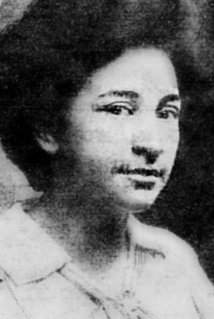
Gertrude Elizabeth Curtis, also known as Gertrude Curtis McPherson, was an American dentist. She had a longtime practice in Harlem.
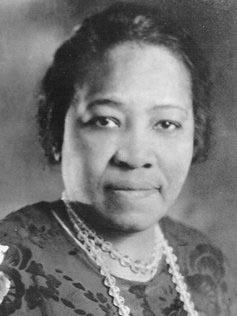
Sue M. Wilson Brown was an African-American activist for women's suffrage. She was inducted into the Iowa Women's Hall of Fame in 1995.